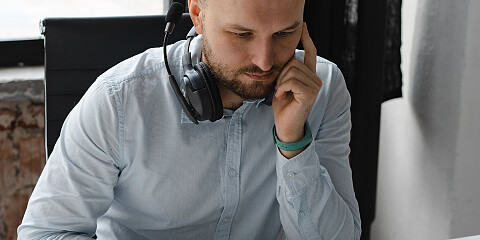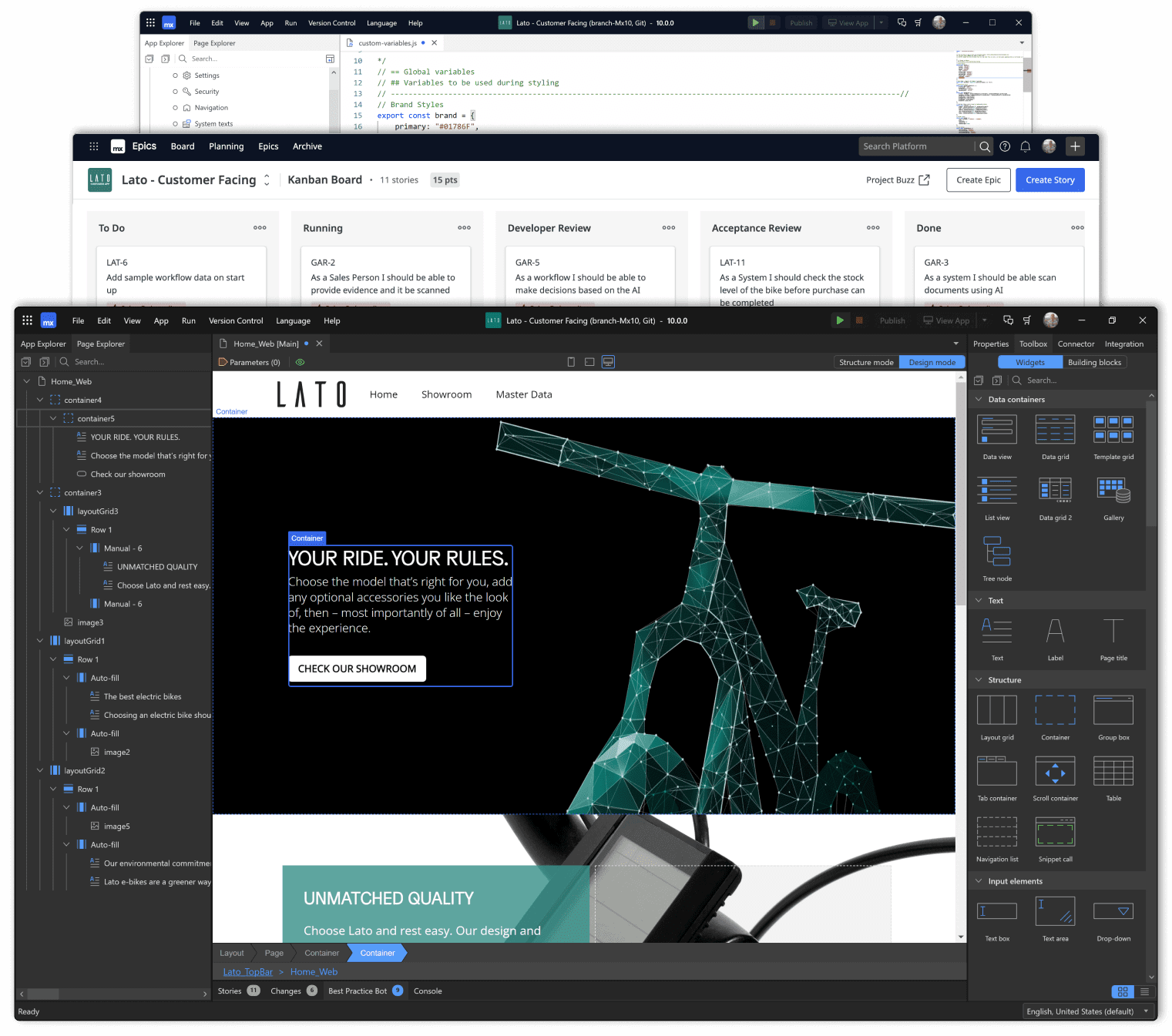
Embracing Low Code Application Development with Mendix
February 20, 2024
Accelerate your Application Backlog with Low Code, and turn your projects into reality without complications
As companies strive to stay ahead and meet the changing needs of their customers, traditional software development methods often fall short in terms of speed, flexibility, and cost-effectiveness.
Low Code is an application development methodology that enables creating software with less manual coding. Instead of writing all the code from scratch, users leverage specialized platforms offering visual components and tools to expedite the development process. These platforms allow users to drag and drop elements, define business rules, and connect services without the need for extensive lines of code.
As we saw in our initial post on the topic, Low Code serves as the catalyst for enterprise applications, reducing the time needed to create them, containing the associated costs, and making it accessible to a wider range of users.
The Low Code Revolution
Low Code development has gained momentum in recent years due to its ability to accelerate development time, reduce costs, and enhance business agility.
With predictions indicating that 70% of applications will use Low Code technologies by 2025, it's evident that this approach is transforming the software development landscape. In this regard, Gartner's quadrants are a widely recognized framework for evaluating and positioning various technologies within their respective fields.
Back in 2015, when the term Low Code was coined, the technology was in its nascent, hesitant, and erratic stages, as is typical with any beginning, with little differentiation among players and scores concentrated in the center of the quadrants. At that time, it was a risky bet, but now we see how Low Code technology is growing and consolidating.
Comparing the last two editions, from 2019 to 2023, there is a decrease in the number of actors and a significant increase in those who have truly embraced this technology. In fact, there are four that are in a very advantageous position, indicating that Low Code is not a passing fad but a solution that has been present in the market for some time and is increasingly being embraced.
Within its Low Code project ecosystem, SNGULAR works with Microsoft Power Platform and Mendix. Both offer tools and services to help users create high-quality enterprise applications without the need for advanced programming knowledge, transforming how their processes are managed and enabling the development of complex applications with ease, from data model creation to integration with other systems.
In this post, we will focus our attention on Mendix, a leading Low Code platform.

Mendix, Undisputed Leader
Observing its evolution within Gartner's quadrants, we can clearly see its ascent, being recognized as the absolute leader in the latest 2023 edition.
With its focus on accessibility, scalability, and security, Mendix empowers organizations to innovate and respond quickly to changing market demands.
The platform offers a wide range of features and functionalities, including native cloud development capabilities, project management tools, and a vast selection of prebuilt user interface components.
This enables development teams to create high-quality enterprise applications quickly and efficiently, without the need for specialized programming knowledge.
Mendix's benefits are highlighted by its remarkable flexibility, allowing applications to be generated in various forms to suit specific needs. From progressive web applications, ideal for both fixed and mobile browsers, to native or hybrid applications for mobile devices, and even offline applications that work without connectivity.
Applications developed with Mendix range from process automation and optimization to operational extension of ERP systems, IoT-based solutions, legacy application replacement, and departmental document transformation, providing efficiency, productivity, and security through a comprehensive platform.
Agility, Creativity, Innovation, and Security as Hallmarks
One of Mendix's standout features is its focus on agile development, facilitated by its integrated project management tool. From sprint planning to continuous iteration and deployment, Mendix offers a collaborative environment that drives software development efficiency and quality.
Within the realm of creativity, Mendix Studio allows users to design and build applications quickly and easily, thanks to its intuitive graphical interface and wide range of predefined widgets and components.
And when it comes to driving efficiency, automation and artificial intelligence are key elements in Mendix's arsenal, with features such as microflows, nanoflows, and integrated AI assistants to accelerate development and improve accuracy. These capabilities not only streamline developer workflow but also enhance the end-user experience.
Finally, security and deployment are crucial elements in any application. Mendix offers different levels of security, ranging from application access to securing individual components. This allows for precise control over users and their actions.
It also offers, by default, three levels of security: off for prototypes, testing, and production. As we progress through the application lifecycle, we can implement different security aspects as needed. Once the application is ready, it is crucial to deploy it.
For this purpose, the platform offers high flexibility, allowing deployment on its own cloud infrastructure or in hybrid environments, ensuring successful and secure implementation.

Mendix is Siemens
One of Mendix's key strengths lies in its integration with Siemens, a leading company in industrial technology and automation. The collaboration between Mendix and Siemens has enabled both companies to offer integrated solutions that address the most pressing challenges of digital transformation, even entering the top 10 worldwide software companies.
With over 100,000 users, Siemens is the largest user of Mendix, using the platform to modernize manufacturing processes, improve healthcare services delivery, and increase operational efficiency across the enterprise.
Licensing Model and Support
Mendix offers a flexible licensing model that adapts to the needs of organizations of all sizes.
The platform uses an annual subscription model based on the number of internal users, allowing companies to scale their operations cost-effectively.
Additionally, Mendix offers a wide range of training and support resources, including online training courses, tutorials, and detailed documentation. This ensures that development teams have the knowledge and skills necessary to make the most of the platform.
Continuous Innovation and the Future of Application Development
As Low Code development continues to evolve, Mendix is expected to continue playing a central role in shaping the future of enterprise application development.
With a focus on continuous innovation and enhancing platform capabilities, Mendix is well positioned to help organizations tackle future challenges and seize emerging opportunities.
Whether automating internal processes, supporting High Code developments, improving the customer experience, or driving digital transformation across the enterprise, Mendix and SNGULAR represent an extremely compelling choice for organizations looking to innovate and thrive in a digitally driven world.
At SNGULAR, we are not just your technology provider but a reliable partner committed to helping you meet and exceed your ever-evolving expectations.
If you are interested in improving your company's performance, we can help you develop unique solutions to meet the specific needs of your business. We work with you hand in hand, strategically leveraging technology to optimize your processes and take your company to the next level.
Our latest news
Interested in learning more about how we are constantly adapting to the new digital frontier?

Insight
December 26, 2025
Ferrovial improves heavy construction efficiency with ConnectedWorks

Event
November 24, 2025
White Mirror 2025: the blank mirror reflecting what is yet to come


